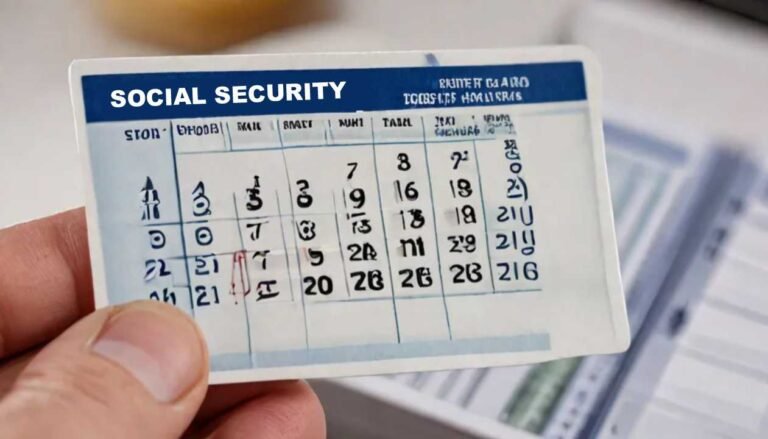How Delaying Social Security Benefits Could Boost Your Retirement Income
Many people anticipate retirement, but it also requires careful planning for them to be financially secured. One of the biggest decisions you will have as you approach retirement is when to begin claiming your Social Security benefits. Although you may find it appealing to claim Social Security as early as age 62, waiting for benefits can mean a significant increase in your monthly retirement income. Let’s discuss how delaying benefits of Social Security may serve as a potent tool towards an easier and financially sound retirement.
Understanding Social Security’s Full Retirement Age
But first, let’s define Social Security Full Retirement Age. The FRA is a certain age in which one is eligible to receive full monthly benefits based on the individual’s earnings record without experiencing any reduction due to the fact that they are taking out early. Depending on birth year, the FRA will range for most people between 66 and 67 years of age.
When you file early, your benefits will be reduced permanently. So, for instance, you would actually reduce your monthly benefit checks by as much as 25 percent to 30 percent if you filed at age 62. If you delay beyond your FRA, you’ll increase the payments you receive every month. Let’s look at the numbers and how they work in your favor.
Social Security Benefits Reduction by Early Filing
| Age of Claiming | Monthly Benefit Reduction | Percent Reduction from Full Benefit |
|---|---|---|
| 62 | $1,600 | 25% |
| 63 | $1,700 | 20% |
| 64 | $1,800 | 15% |
| 65 | $1,900 | 10% |
| 66 (FRA) | $2,000 | 0% (Full Benefit) |
| 67 | $2,100 | 0% (Full Benefit) |
The Financial Impact of Delaying Your Claim
The longer you delay the start of your Social Security benefit, the larger your monthly benefit will be. The more time you wait, the greater the benefits you’ll enjoy. If you delay taking Social Security until age 70, the benefits will increase by as much as 25 percent over what you would have received if you started drawing benefits at your FRA. That is from delayed retirement credits, one for each month after you reach your FRA until you reach age 70.
Suppose that your monthly Social Security benefit at the FRA is $2,000. We know that delaying until age 70 may increase the amount by $500-$700 per month. That’s quite a range of difference in income and would certainly give you more flexibility and security in retirement. That increase goes a long way and forms a pretty persuasive argument for delaying the claim.
The Impact of Delaying Social Security Benefits
| Claim Age | Benefit at FRA (Age 66/67) | Benefit at 70 (with Delay Credits) | Increase from FRA to 70 |
|---|---|---|---|
| 66/67 | $2,000 | $2,500 | +25% |
| 67 | $2,100 | $2,625 | +25% |
| 68 | $2,200 | $2,750 | +25% |
| 69 | $2,300 | $2,875 | +25% |
| 70 | $2,400 | $3,000 | +25% |
The Power of Compounding Returns
Just think, delay the claim further and increases not only your monthly benefit check, but it also builds on compounding returns. The longer you delay, the larger the increase of the monthly benefits, which will give you a bigger stream that can sustain for many years. This rise is not just an added temporary boost but permanent, paying off in your entire retirement.
This is even if you have other sources of savings and investment during retirement, Social Security is one of the most reliable ones. This maximizes the benefit possible in Social Security, which reduces dependency on other assets and investments that can grow and give more income during old age.
Why Waiting Until Age 70 Makes Sense
It frequently pays to wait until age 70 to take Social Security benefits unless you are in poor health and badly need the money. A two-year difference may not seem like much; however, delaying your Social Security claim could offer you priceless benefits in the long run.
Furthermore, if you outlive the average, your total increase in your monthly payments might be much greater than the smaller checks you would have if you take the early retirement age. Social Security pays more people who live longer money during their years of retirement.
Break-Even Analysis: Early vs. Delayed Social Security Claims
| Age at Claiming | Monthly Benefit | Cumulative Benefit by Age 80 | Cumulative Benefit by Age 85 | Time to Break Even (Age) |
|---|---|---|---|---|
| 62 | $1,600 | $345,600 | $388,800 | 80 |
| 67 | $2,100 | $378,000 | $423,000 | 80 |
| 70 | $2,800 | $403,200 | $451,200 | 81 |
The Risk of Leaving Money on the Table
Another important thing to take into account is that when you wait until after the age of 70 to file for Social Security, you are not leaving money on the table either. There are only six months that retroactive benefits in Social Security can be provided before you have even applied for them, and if you wait longer than seven months after having turned 70, you miss those extra retroactive payments, which actually could amount to a lot of money, thousands of dollars.
Thus, weighing the advantage of waiting until 70 to get what is due against the risk of losing money that is yours to keep is important. A strategy to maximize your retirement income further down the road is delay in claiming your benefits; however, you must time it right so that you will not lose out.
Social Security Benefits and Your Overall Retirement Strategy
Delaying Social Security does indeed mean a higher income stream, but that is just one of several factors you’ll need to consider when deciding on your retirement. Your decision should align with your overall retirement strategy, including how much you’ve put away into retirement accounts, what you expect to spend, and how many years you’re likely to work after you retire.
It could be that there is health-related or an emergency financial need that requires someone to file early, but any one with the ability to delay when they start collecting benefits should look forward to doing so, since they are likely to find they can wait longer than they imagine to begin drawing their Social Security checks. Your decision to claim early or delay should be reviewed periodically as your financial life changes.
Comparison of Social Security Claiming Scenarios: Early vs. Delayed
This table sums up all the comparisons to give a holistic view of how claiming early versus delaying impacts retirement income, considering other savings and investment strategies.
| Scenario | Claiming at 62 | Claiming at 67 | Claiming at 70 |
|---|---|---|---|
| Monthly Social Security Benefit | $1,600 | $2,100 | $2,800 |
| Cumulative Benefit by Age 80 | $345,600 | $378,000 | $403,200 |
| Cumulative Benefit by Age 85 | $388,800 | $423,000 | $451,200 |
| Impact on Spouse’s Benefit | Lower | Moderate | Higher |
How Delaying Can Boost Your Spouse’s Benefits
If you are married, waiting until you apply for Social Security yourself has a knock-on effect beyond just affecting your own potential benefit. It can mean that there is quite a significant impact on your spouse’s possible benefit too. Since spousal benefits enable your spouse to claim half of your Social Security benefits in the event his or her benefit amounts are lower, delayed applicability at 70 may make your spouse receive a bigger payment, thus significantly contributing to both of you being able to enjoy a better retirement eventually.
And, by delaying your claim and dying first, your spouse would be able to get your greater benefit amount as a survivor’s benefit, which could ensure him or her a much greater income throughout his or her lifetime.
How Social Security Delays Affect Spouse’s Benefits
| Claimant Age | Primary Beneficiary’s Monthly Benefit | Spouse’s Monthly Benefit (If Claimed at FRA) | Spouse’s Benefit if Claimant Delays to Age 70 |
|---|---|---|---|
| 62 | $1,600 | $800 | $1,000 |
| 67 | $2,100 | $1,050 | $1,400 |
| 70 | $2,800 | $1,400 | $2,100 |
Weighing the Pros and Cons of Delaying
Timing of When to Claim Social Security There is not a single, one-size-fits-all answer to this question. While delaying benefits can significantly boost retirement income, at least the following factors are noteworthy:
- Health and Longevity: If you expect to live well into your 80’s or 90’s, it’s probably sensible to delay benefits. If you have health concerns that will likely shorten your life, earlier claiming might be preferable.
- Retirement Savings: Provided that you already have sufficient retirement savings, then this step can allow your money to grow and add more security for you in the future.
- Income Needs: You already require the money shortly, so it would be unwise to delay further. However, if you can hold on and wait a little longer, taking your claim much later can give you an edge in the long-term benefits that are quite quite substantial.
| Pros | Cons |
|---|---|
| Higher monthly benefits (up to 25% more) | Requires waiting until age 70 for maximum benefit |
| Increased long-term retirement income | Risk of missing benefits if you pass away before 70 |
| Larger spousal and survivor benefits | Delayed payments may impact short-term cash flow |
| More secure financial base in later years | Less flexibility for urgent financial needs |
Conclusion: Make the Right Choice for Your Future
In fact, one of the most decision-making reasons for delaying Social Security is a serious choice but impacts retirement income greatly. Understanding the financial benefits of waiting, as well as the risks of claiming too early, will help you make an informed decision, setting yourself up for much more comfortable and secure retirement. Whether you’re looking for a higher monthly payment, more financial flexibility, or better security for your spouse, delaying Social Security is a strategy that can pay off for years to come.
Ultimately, the decision to delay Social Security should fit within your overall retirement plan. By taking the time to weigh your options, you’ll be better positioned to make the choice that works best for you—and secure the retirement you’ve worked so hard to achieve.
- Who Gets December Social Security Payment of $4,873 That Goes Out in 3 Days: When and What to Expect - December 9, 2024
- Unlocking the $5,000 Social Security Check: 2025 COLA and How to Maximize Your Benefits - December 8, 2024
- 2024 Stimulus Checks: Which States Are Paying $500 Monthly and How to Qualify - November 25, 2024







